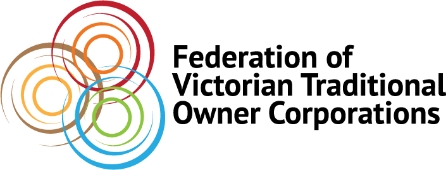The Federation is delivering the Aboriginal Culture and Healing Flood Recovery Grant Program.
Two round of grants have been available to Aboriginal communities and Traditional Owner groups to lead flood recovery work in areas of Victoria affected by the October 2022 floods.
The program seeks to recognise the disproportionate impact natural disasters have on Aboriginal communities and the central role they play in leading recovery efforts.
Six projects were funded under the program’s first round in 2023 and round two recipients will be announced in October 2024.
The Aboriginal Culture and Healing Flood Recovery Grant Program’s objectives are:
- Aboriginal people’s unique experiences of trauma are addressed and healing supported
- Recovery and resilience are strengthened through Aboriginal culture, knowledge, and the connection between Country and healing
- Aboriginal communities have increased capability to lead recovery and healing.
Please read the funding guidelines and template grant agreement carefully to ensure your organisation and project are eligible.
When you’re ready, please complete the application form, then send the completed application form to [email protected] before 5pm on 19 August 2024.
For questions about applications, please contact the Federation’s Grants Administration team at [email protected]
Eligible applicants will:
- be an Aboriginal organisation and/or social enterprise (may be supported by auspice organisations);
- be in a listed Victorian local government area directly impacted by the October 2022 floods; and
- demonstrate that their project is relevant to the flood-affected area.
Funding guidelines with more information on round two eligibility will be published on 23 July. See round one funding guidelines here.
Round one of the Aboriginal Culture and Healing Flood Recovery Grant Program funded six Aboriginal organisations to lead flood-recovery projects in the first half of 2024.
Barengi Gadjin Land Council (BGLC)
BGLC’s project will rebuild damaged pathways and infrastructure at its Dalki Garringa Native Nursery, which was left in disarray after the floods. The project focuses on renovating and stabilising the paths, refurbishing drainage systems, and controlling weeds and will be delivered by a local Indigenous workforce.
Duduroa Dhargal Aboriginal Corporation (DDAC)
DDAC’s project will deliver workshops over two weekends at Ryan’s Lagoon, an important cultural wetland area that was impacted by the floods. The workshops will focus on building the capacity and cultural knowledge of community members. The workshop agenda will include topics such as plant identification and use (including weaving), sharing of stories and protection of the native turtle species.
Dja Dja Wurrung Clans Aboriginal Corporation (DJAARA)
DJAARA’s project will undertake assessments of cultural heritage sites on Djandak (Country) to determine which places have been affected by the floods and to what extent. The information collected will provide scope for DJAARA to plan for the management and healing of these sites and enable DJAARA to identify and mitigate the future flood risk to cultural heritage places.
Eastern Maar Aboriginal Corporation (EMAC)
EMAC’s project will financially support 10 Eastern Maar citizens to undertake Certificate III units at South West TAFE relating to flood recovery, waterway management and rehabilitation. This will build the capacity of community to prepare for flood emergencies that will impact Eastern Maar Country and assets and equip them with the skills necessary to act in both emergency response and flood recovery.
Moogji Aboriginal Council East Gippsland Inc (Moogji)
Moogji’s project will repair and rehabilitate flood damage that occurred at its 40-acre Bonang Property, which is home to a nursery, a community garden and a cultural trail. Key activities include debris removal, topsoil replacement, weed control, water diversion and irrigation works, and revegetation. Community members will have the opportunity to work on-Country in delivering the project.
Wurundjeri Woi-wurrung Cultural Heritage Aboriginal Corporation (WWWCHAC)
WWWCHAC will investigate flood-impacted areas of Wurundjeri Country through remote sensing methods (flood data analysis and flood level mapping). Data gathered will inform targeted on-Country walks for Wurundjeri people and staff to investigate and record impacted sites and landscapes, which will lead to updates of the Victorian Aboriginal Heritage Register. The project will be supported by the University of Melbourne.
Successful round two recipients will be announced in October 2024.
The Federation has partnered with Emergency Recovery Victoria to deliver the Aboriginal Culture and Healing Flood Recovery Grant Program.
The Federation’s role involves:
- promoting the grant program to potential applicants
- supporting potential applicants to develop and submit strong grant applications
- overseeing successful project reporting and acquittal
The Federation is a conduit between grant applicants and Emergency Recovery Victoria and is the contact point for all prospective and successful applicants.
For general information, please contact the Federation’s Grants Administration team at [email protected]
To discuss a specific project, please contact Jill Webb on 0408 586 297 or [email protected]

